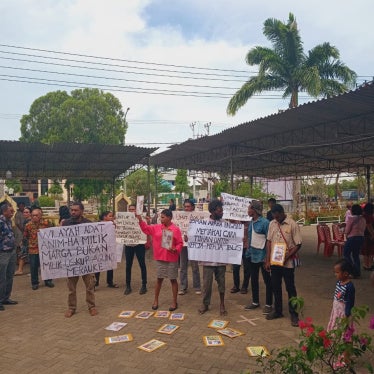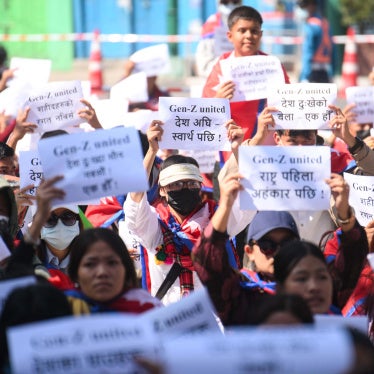We, the undersigned civil society organisations,write to you to express our serious concerns about the judicial action against magazine editor and human rights defender Mr.Somyot Prueksakasemsuk, as a result of the Thai government’s use of Article 112 of the Criminal Code (the lèse-majesté law) to criminalise speech and peaceful dissent, in violation of international human rights law.
Somyot Prueksakasemsuk was the editor of the magazine Voice of Taksin (“Voice of the Oppressed”) and a labour and pro-democracy activist. He has been detained since April 30, 2011 and was charged in July 2011 under Article 112 of the Criminal Code, the lèse-majesté provision, for two satirical articles written by someone else that were published in Voice of the Oppressed in 2010 and that allegedly insulted the monarchy. His arrest came only five days after he held a press conference in Bangkok to launch a campaign to collect 10,000 signatures to petition for a parliamentary review of the lèse-majesté law, which he criticised as being contradictory to democratic and human rights principles. In July 2012, Somyot was one of five human rights defenders shortlisted for the Somchai Neelapaijit Award for outstanding human rights work in Thailand. The award, named after the prominent disappeared human rights lawyer, honours human rights defenders who have fought to protect human rights bravely and vigorously, and have put themselves at risk to do so.
Somyot’s trialended on May 4, 2012.The Criminal Court announced that it will convene again on September 19, 2012, when the verdict may be announced. Somyot Prueksakasemsuk is currently detained in the Bangkok Remand Prison, along with several other persons who are either serving their sentences after being convicted for lèse majesté or awaiting a verdict. Although he faces a sentence of 30 years in prison if found guilty, he has rejected pleading guilty to receive a lighter sentence as he believes that freedom of opinion and expression is his right.
Somyot Prueksakasemsuk is currently in his 17th month of remand detention. Provisional release for persons accused of a criminal offence is provided for in Section 40(7) of the 2007 Constitution and Section 107 of the Criminal Procedure Code. He has made eleven applications for bail but the courts have denied them all, claiming he is a flight risk and could tamper with evidence. However, the court has failed to consider less restrictive steps to mitigate these risks, such as seizing his passport. Moreover, research has shown that during the past two years,Thai courts have systematically denied bail to alleged lèse-majesté offenders, like Somyot, who are affiliated with the “red-shirt”[1]political movement.[2]
Thailand’s treatment of Somyot Prueksakasemsuk has been in violation of the International Covenant on Civil and Political Rights (ICCPR), to which Thailand is a State party. His pro-longed pre-trial detention violates Article 9(3) of the ICCPR, which states that “[i]t shall not be the general rule that persons awaiting trial shall be detained in custody.” The United Nations Human Rights Committee has stated that "[p]re-trial detention should be an exception and as short as possible.”[3] Pre-trial detention should not be used as a form of punishment.
The Human Rights Committee has stated that excessive pre-trial detention may, in itself, be a violation of the rights to liberty and presumption of innocence. In the case of Somyot Prueksakasemsuk, no adequate justification of the necessity of such prolonged pre-trial detention has been provided, and no explanation has been given as to why non-custodial measures are insufficient to ensure his appearances in court or to prevent any reasonably anticipated interference with the administration of justice. In December 2011, the UN Office of the High Commissioner for Human Rights (OHCHR) expressed its concern about the extended periods that persons accused of lèse-majesté are being held in pre-trial detention in Thailand.[4]
In June 2011, two UN human rights experts sent a joint urgent appeal to the Thai government raising concerns about several lèsemajesté cases against human rights defenders, including Somyot Prueksakasemsuk.[5] The government replied that the actions taken against them were justified on the ground that their activities “politicised” the role of the monarchy and created “division” in Thai society. In December 2011, four UN human rights experts again raised his case with Thailand and urged the government to “take all necessary measures to guarantee that the rights and freedoms of Somyot Prueksakasemsuk are respected.[6]”
You may also be aware that on May 30, 2012 the Criminal Court issued its verdict in the case of Ms. ChiranuchPremchaiporn, Executive Director of the online news website Prachatai. She was sentenced to one year imprisonment and a fine of 30,000 Thai baht (about 770 Euros) under the Computer Crimes Act, another law that has been used indirectly to press lèse-majesté charges in violation of fundamental rights. The court reduced her sentence to an eight months’ suspended prison term and a 20,000 Thai baht (about 510 Euros) fine because of her cooperation in the judicial process. The sentence she received was less harsh than many observers expected, which we attribute to the intense scrutiny and international pressure directed at the Thai government’s decision to prosecute her case. Representatives of diplomatic missions in Bangkok observed her trial and actively engaged and made representations to Thai government officials about her case.
It is worrying that Criminal Code Article 112 on lèse-majesté is being increasingly used to restrict the right to freedom of expression in Thailand. Information released by the Office of the Judiciary indicates a rise in the number of complaints filed under Article 112 from 33 in 2005 to 478 cases in 2010. Moreover, the sentence for a person convicted of violating Article 112 is between 3 to 15 years while the crime of defamation against a non-Royal person is a maximum three years. The UN Human Rights Committee, in its general comment on the right to freedom of expression, stated that “all public figures, including those exercising the highest political authority such as heads of state and government, are legitimately subject to criticism and political opposition”, and it expressed concerns about laws, such lèse-majesté, that provide for harsher penalties solely on the basis of the identity of the person claiming defamation.[7]
In October 2011, the UN Special Rapporteur on the right to freedom of opinion and expression, Frank La Rue, stated that the “Thai penal code and the Computer Crimes Act (…) are vague and overly broad, and the harsh criminal sanctions are neither necessary nor proportionate to protect the monarchy or national security”. He called on the government to “hold broad-based public consultations to amend Article 112 of the penal code and the 2007 Computer Crimes Act so that they are in conformity with the country’s international human rights obligations”.[8] In the course of the Universal Periodic Review (UPR) of its human rights record in October 2011, Thailand received more than a dozen recommendations on the lèse-majesté law and the Computer Crimes Act. However, Thailand rejected all these recommendations.
We urgently request that your government express deep concerns to the Royal Thai Government aboutthe crackdown on the exercise of the fundamental right to freedoms of expression and opinion in Thailand. We call on you to instruct your country’s embassy in Thailand to treat this as a priority issue and strongly urge the Thai authorities to take clear steps to protect fundamental freedoms. In particular, we request your government to urge, publicly and privately, the government of Thailand to:
- Instruct prosecutors to withdraw all charges under Article 112 against Somyot Prueksakasemsuk and ensure he is immediately released from detention;
- Guarantee that all persons, including human rights defenders,are able to peacefully exercise their right to freedom of expression without fear of reprisals and restrictions, in line with the ICCPR and the UN Declaration on the Rights and Responsibility of Individuals, Groups and Organs of Society to Promote and Protect Universally Recognized Human Rights and Fundamental Freedoms (Declaration on Human Rights Defenders);
- Fulfill its obligations under the ICCPR, other international human rights treaties and principles,to prohibit arbitrary detention, including unnecessary pre-trial detention, and protect the rights to freedom of expression and opinion, and to a fair trial;
- Amend or repeal the lèse-majesté law and provisions of the Computer Crimes Act in order to bring these laws in line with Thailand's international human rights obligations, as recommended by the UN Special Rapporteur on the promotion and protection of the right to freedom of opinion and expression as well as other UN Member States during the UPR; and
- Invite without delay the UN Special Rapporteur on the promotion and protection of the right to freedom of opinion and expression to visit Thailand and draw on his assistance in reforming laws and practices that restrict or violate the rights to freedom of opinion and expression.
We also urge your government’s representatives to visit Somyot Prueksakasemsuk and other lèse-majesté detainees in prison and to send high-level observers to the Criminal Court on September 19, 2012, and to any subsequent court sessions in this case.
We thank you very much for taking our concerns and recommendations into consideration. We look forward to receiving your response.
Sincerely yours,
Brad Adams
Executive Director, Asia Division, Human Rights Watch
Souhayr Belhassen
President, International Federation for Human Rights (FIDH)
Christa de Bruin
Coordinator, Clean Clothes Campaign-Netherlands
Daniel Calingaert
Vice President of Policy and External Affairs, Freedom House
Dr Agnes Callamard
Executive Director, ARTICLE 19
Brittis Edman
Southeast Asia Programme Director, Civil Rights Defenders
Carmen Heumann
President, Peuples Solidaires
Benjamin Ismaïl
Head of Asia-Pacific Desk, Reporters Without Borders (RSF)
Klaus Melvin Jensen
Coordinator, Clean Clothes Campaign-Denmark
Mary Lawlor
Director, Front Line Defenders
Carin Leffler
Coordinator, Clean Clothes Campaign-Norway
Sam Maher
Coordinator, Labour Behind the Label
Joel Simon
Executive Director, Committee to Protect Journalists
Julia Spetzler
Coordinator of Urgent Appeals, Clean Clothes Campaign-Switzerland
Gerald Staberock
Secretary General, World Organisation Against Torture (OMCT)
Lars Stubbe
Coordinator, Clean Clothes Campaign-Germany
Gayathry Venkiteswaran
Executive Director, Southeast Asia Press Alliance (SEAPA)
Arjan van der Wall
Programme Director, Protection International
Wong Kai Shing
Executive Director, Asian Human Rights Commission (AHRC)
Yap Swee Seng
Executive Director, Asian Forum for Human Rights and Development (FORUM-ASIA)
Ineke Zeldenrust
International Coordinator, International Secretariat, Clean Clothes Campaign
[1] A movement led by the United Front for Democracy against Dictatorship (UDD).
[2] HRW, Courts Denying Bails in Lèse Majesté Cases, February 24, 2012.
[3] See General Comment 8 of the UN Human Rights Committee.
[4] OHCHR, press briefing note on Thailand, December 9, 2011: http://www.ohchr.org/EN/NewsEvents/Pages/DisplayNews.aspx?NewsID=11704&LangID=E(Accessed on August 25, 2012).
[5] Joint urgent appeal by the UN Special Rapporteur on freedom of opinion and expression and the Special Rapporteur on the situation of human rights defenders, June 10, 2011: https://spdb.ohchr.org/hrdb/19th/UA_Thailand_10.06.11_(5.2011).pdf
[6] Joint urgent appeal by the Chair-Rapporteur of the Working Group on Arbitrary Detention, Special Rapporteur on the independence of judges and lawyers, Special Rapporteur on the promotion and protection of the right to freedom of opinion and expression, Special Rapporteur on the situation of human rights defenders, December 20, 2011:
https://spdb.ohchr.org/hrdb/20th/UA_Thailand_20.12.2011_(9.2011).pdf.
[7] UN Human Rights Committee, General Comment No. 31 (CCPR/C/GC/34), September 12, 2011.
[8] OHCHR, Thailand / Freedom of expression: UN expert recommends amendment of lèse majesté laws, October 10, 2011. http://www.ohchr.org/EN/NewsEvents/Pages/DisplayNews.aspx?NewsID=11478&LangID=E(Accessed on August 25, 2012).








